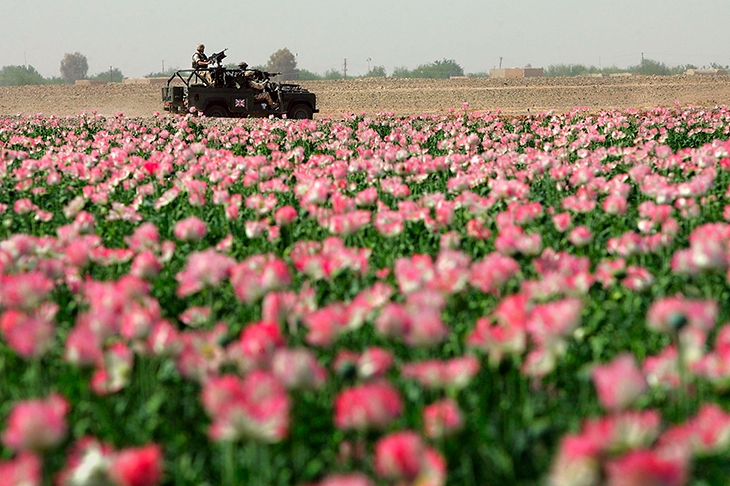In his history of the Pacific War, Eagle Against the Sun, Ronald Spector described the state of the US army on the eve of the second world war: ‘The main enemies were boredom and debt. The answer to such problems was often liquor.’ When the officer corps was not boozing, it was sufficiently obsessed with athletics to derail training, for ‘success at football and boxing could be as important to a man’s career as success in manoeuvres’. Its weapons were decrepit and its ranks ragged. George Marshall, the future chief of staff, commanded a notional battalion that numbered fewer than 200 men.
That portrait of antebellum decay came to mind when reading The Changing of the Guard, a scathing account of the British army in the years after 9/11. Simon Akam begins his story at the turn of the millennium in Germany, where the residue of what was once the British Army of the Rhine (BAOR) lies in what he portrays as bacchanalian stupor. Officers play polo and guzzle Pol Roger. Soldiers drink themselves to oblivion with tax-free booze before piling into the local brothel, ‘as though adhering to that central plank of British military doctrine which holds that a successful assault requires a three-to-one numerical advantage’.
Class is never far from the surface. The Royal Scots Dragoon Guards, a regiment in which Akam briefly served a gap year commission and which will not recruit a state- school-educated officer until 2003, mocks the rival Royal Tank Regiment as ‘council house cavalry’. When war in Iraq comes, they pack their riding crops. What they lack are spare parts. And so the 7th Armoured Brigade, the regiment’s parent unit, earmarked for the Gulf, can only traverse 95km, enough to get to Basra, rather than the 500km to Baghdad with the American juggernaut.

Things do not improve once they get there. In Basra, besieged by Iran-backed Shia militia, the army eventually cut a humiliating deal to stay out of the city in exchange for peace. In Helmand, in southern Afghanistan, their presence worsens the insurgency rather than calming it. In both theatres, the Americans eventually step in. The traditional story of these failures is one of brave soldiers being stabbed in the back by penny-pinching politicians and jobsworth civil servants. Akam is having none of this.
In his telling, the army is not a victim of political machination but an enthusiastic party to it. It does not want to miss out on the first big scrap since 1990, not least because defence cuts are looming. When a lieutenant colonel is asked to estimate the forces required for Helmand in 2005, he reports back that it will take a 6,000-strong brigade and plenty of air power. He is slapped down, and told to make do with a battlegroup of infantry. ‘Did we give complacent advice on the viability of a force of 3,150 in Afghanistan with a bungled command chain?’ wonders Peter Wall, the deputy chief of joint operations who will later become chief of defence staff: ‘Yes, we did.’
Arriving in Basra, the British boasted that their light touch would show up the gung-ho Americans
One resulting irony is that wars waged at least partly to build influence with America result in lasting reputational damage in Washington. British soldiers arrive in Basra crowing that their light touch, honed in Northern Ireland, will show up the gung-ho Americans. But when Lloyd Austin, an American lieutenant general, visits in 2007, he is baffled by Britain’s accommodation of the enemy and its unwillingness to halt Iranian arms shipments. ‘We’ll probably have to come back here and fight,’ he notes, correctly. Austin is now Joe Biden’s secretary of defence.
It would be easy to dismiss The Changing of the Guard as a polemic that turns too heavily on anecdote and personality. Akam has shone a light on the more lurid corners of the army, but preening Household Cavalry officers in Knightsbridge are not representative of the institution as a whole. Despite Akam’s picture of Sodom on the Rhine, the quality of lieutenant colonels and brigadiers in Iraq and Helmand was generally higher than in the first Gulf War.
Capturing the culture of the British army, the largest employer in Britain after the NHS, is difficult. As one officer suggests to Akam, it is not a single organisation but a ‘collection of warring tribes’. For the army’s defenders, this ecumenicalism is a source of strength. But it also suggests why some units went in guns blazing — Akam accuses the Paras of ‘bloodlust’ — while others were more judicious. There is certainly a tension between Akam’s charge that the army institutionally rewarded belligerence through the medal system and his account of its defensive crouch in Basra.
What is admirable, though, is that Akam has not just done his homework, interviewing 260 people, but also shows his working in 89 pages of footnotes, full of forensic detail — and delicious gossip. Moreover, many of his conclusions find support in Blood, Metal and Dust, a strikingly complementary book by Ben Barry, a retired brigadier who wrote the British army’s study of lessons learned in Iraq. His assessment is less colourful, but quietly savage in its own fashion. Whereas Akam focuses on cultural factors, Barry is more interested in political judgment and military command. Many of the mistakes that he catalogues, such as a lack of helicopters, were out of the army’s hands. But that does not mean the army is off the hook.
It was its choice, for instance, to limit rotations to six months, half the length of American tours. In one 18-month period, the British brigade in Basra was commanded by five different officers at a time when American brigades had two. The most important difference between America and Britain was that American forces chose to embed transition teams in the Iraqi units they had trained, while the British did not. The difference showed in 2008 during the Charge of the Knights, a climactic operation to clear Basra, in which Britain was largely sidelined. ‘Many US officers were disappointed,’ says Barry. ‘Some were shocked.’ A few saw it as the ‘greatest British military disgrace since the fall of Singapore’, writes Akam. It is a scandal that no senior officers were removed from their post during these wars.
Where does this leave the army today? The government is due to publish a detailed defence paper on 22 March. The air force is busy pounding IS and building a next-generation warplane; the navy is cock-a-hoop with a pair of new aircraft carriers, one of which will set sail for Asia next year. The army is in a tighter spot. It will be pruned further, though officials insist it will still be able to field a warfighting division.
Yet the lesson of these two books is that although size matters it is not everything. Culture, leadership and accountability are every bit as important. As the army becomes a force of ‘boots and bots’, as the chief of the general staff put it last year, the tensions between the consolations of tradition and the demands of technology may grow. A leaner force which can learn more quickly from its mistakes and grasp the limits of its powers will be better placed to expunge the ghosts of Basra and Helmand.






Comments